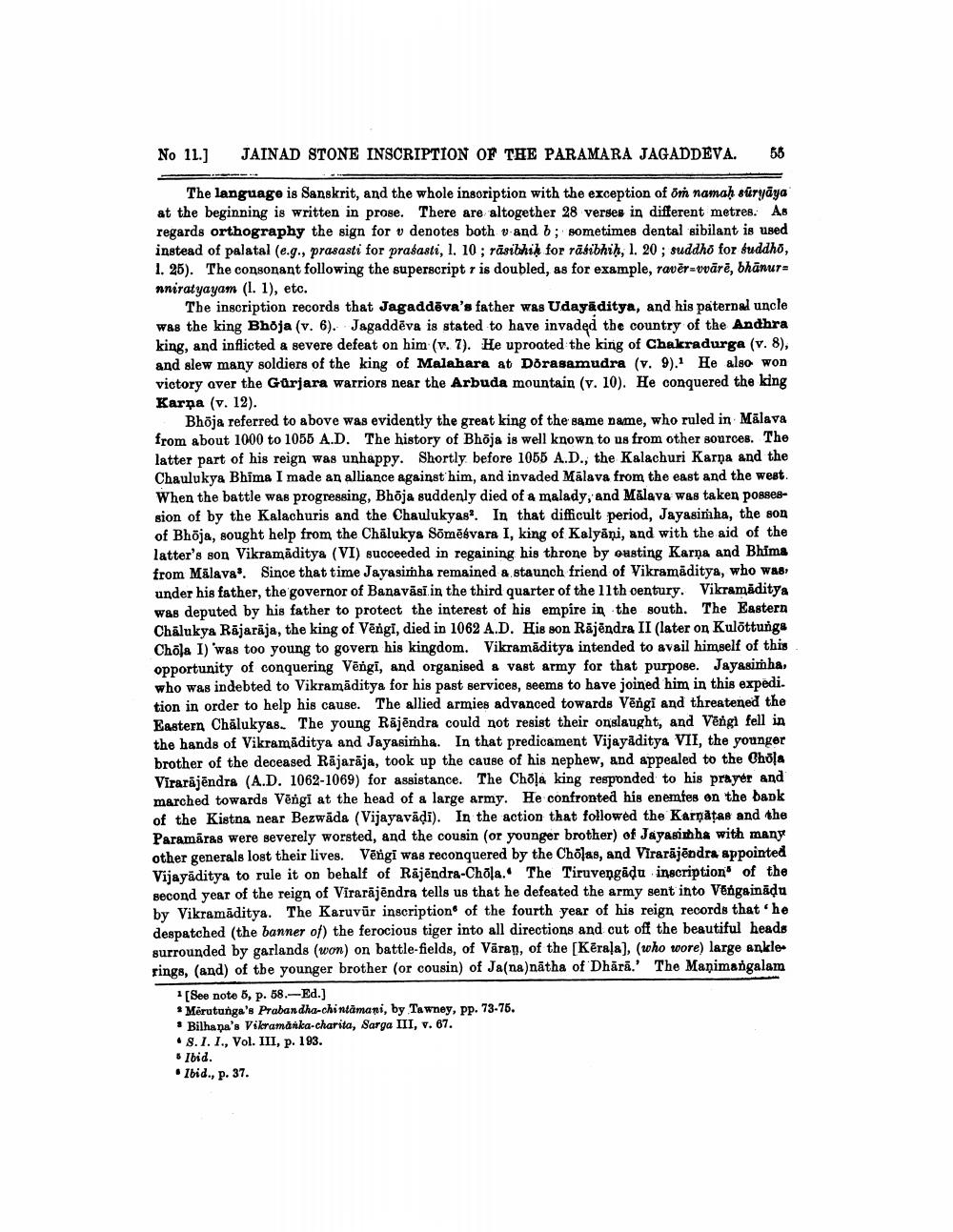________________
No 11.)
JAINAD STONE INSCRIPTION OF THE PARAMARA JAGADDEVA.
56
The language is Sanskrit, and the whole insoription with the exception of oṁ namah sūryāya at the beginning is written in prose. There are altogether 28 verses in different metres. As regards orthography the sign for v denotes both v-and b; sometimes dental sibilant is used instead of palatal (e.g., prasasti for prasasti, 1. 10; tāsibhiḥ for rāfibhiḥ, 1. 20; suddho for tuddho, 1. 25). The consonant following the superscript r is doubled, as for example, ravēr=vvārē, bhānurnniratyayam (l. 1), etc.
The inscription records that Jagaddēva's father was Udayaditya, and his paternal uncle was the king Bhoja (v. 6). Jagaddēva is stated to have invaded the country of the Andhra king, and inflicted a severe defeat on him (v. 7). He uprooted the king of Chakradurga (v. 8), and slew many soldiers of the king of Malahara at Dorasamudra (v. 9). He also won victory over the Gurjara warriors near the Arbuda mountain (v. 10). He conquered the king Karna (v. 12).
Bhöja referred to above was evidently the great king of the same name, who ruled in Mālava from about 1000 to 1055 A.D. The history of Bhoja is well known to us from other sources. The latter part of his reign was unhappy. Shortly before 1055 A.D., the Kalachuri Karna and the Chaulukya Bhima I made an alliance against him, and invaded Mālava from the east and the west. When the battle was progressing, Bhoja suddenly died of a malady, and Mälava was taken possession of by the Kalachuris and the Chaulukyas'. In that difficult period, Jayasimha, the son of Bhöja, sought help from the Chālukya Sõmēsvara I, king of Kalyāņi, and with the aid of the latter's son Vikramaditya (VI) succeeded in regaining his throne by oasting Karna and Bhima from Mālava!. Since that time Jayasimha remained a staunch friend of Vikramaditya, who was under his father, the governor of Banavāsī in the third quarter of the 11th century. Vikramăditya was deputed by his father to protect the interest of his empire in the south. The Eastern Chalukya Rājarija, the king of Vengi, died in 1062 A.D. His son Räjëndra II (later on Kulottunga Chola I) was too young to govern his kingdom. Vikramaditya intended to avail himself of this opportunity of conquering Vengi, and organised a vast army for that purpose. Jayasimha, who was indebted to Vikramaditya for his past services, seems to have joined him in this expedi. tion in order to help his cause. The allied armies advanced towards Vēngi and threatened the Eastern Chalukyas. The young Rajendra could not resist their onslaught, and Vengl fell in the hands of Vikramāditya and Jayasimha. In that predicament Vijayaditya VII, the younger brother of the deceased Rājarāja, took up the cause of his nephew, and appealed to the Chola Virarājēndra (A.D. 1062-1069) for assistance. The Chola king responded to his prayer and marched towards Vēngi at the head of a large army. He confronted his enemfes on the bank of the Kistna near Bezwada (Vijayavādi). In the action that followed the Karnātas and the Paramāras were severely worsted, and the cousin (or younger brother) of Jayasinhha with many other generals lost their lives. Vēngi was reconquered by the Cholas, and Virarājēndra appointed Vijayaditya to rule it on behalf of Rājēndra-Chola.. The Tiruvengadu inscription of the second year of the reign of Virarājēndra tells us that he defeated the army sent into Vengainādu by Vikramāditya. The Karuvür inscription of the fourth year of his reign records that he despatched (the banner of the ferocious tiger into all directions and cut off the beautiful heads surrounded by garlands (won) on battle-fields, of Vāraŋ, of the [Kerala), (who wore) large ankle rings, (and) of the younger brother (or cousin) of Ja(na)nátha of Dhară.' The Manimangalam
[See note 5, p. 58.-Ed.) * Merutunga's Prabandha-chintamani, by Tawney, pp. 73-75. * Bilhana's Vikramanka-charita, Sarga III, v. 67. . 8.1. I., Vol. III, p. 193. 5 Ibid. . Ibid., p. 37.




